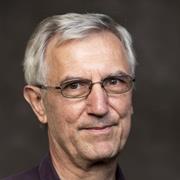Dynamical Systems
Dynamical systems at Tufts involves faculty, graduate students and undergraduate students, and runs a weekly working seminar. The work here encompasses a variety of research subjects in "pure" and applied dynamical systems. These include hyperbolic dynamical systems ("maximally chaotic" ones in which any two time-evolutions drift apart exponentially fast), geometrically motivated dynamical systems (such as free particle motion in curved spaces in the form of geodesic flows, periodic orbits studied with methods of braid theory, mapping class groups, or the trajectories in billiards), ergodic theory (the study of deterministic dynamical systems with probabilistic methods to capture the pseudorandom behavior of complex systems), and methods of hyperbolic dynamics in computational fluid dynamics.
Past topics of senior, master's and doctoral theses include forcing of periodic points, inner and outer billiards, the topology of hyperbolic sets, Sinai—Ruelle—Bowen measures, iterated-function systems, structural stability, recurrence, Ornstein theory, interval maps, measure-rigidity, desingularization of Lorenz-like attractors, Hilbert geometries, Finsler Laplacians, skewed R-covered Anosov flows, gases of hard particles, and shadowing.



